
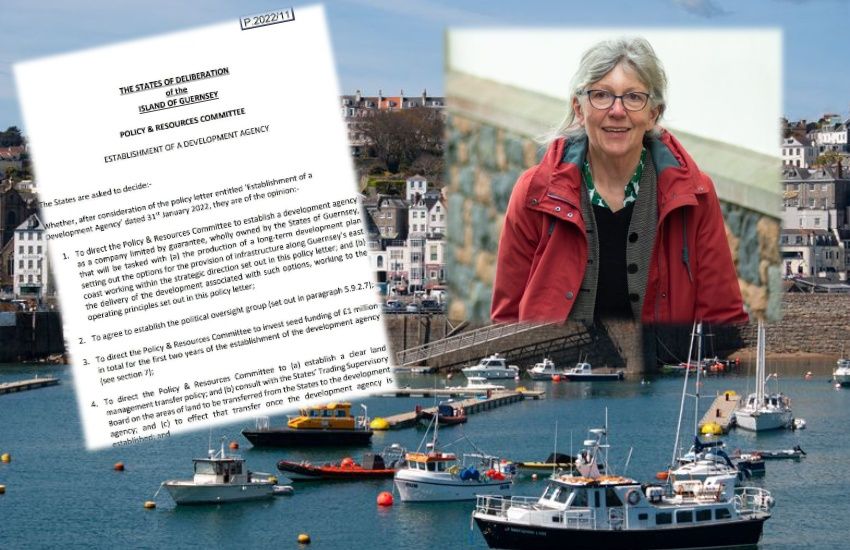

Deputy Yvonne Burford has raised a range of concerns ahead of a States' debate later this month on proposals to change the way Guernsey's east coast is managed.
The Policy & Resources Committee wants the States to set up a development agency – a company owned by the States but with an independent board operating at arm’s length from government - which would run and oversee the development of public land from the Bridge to the southern end of Town.
"I do not feel that the majority of the public are really aware of what is likely to be approved by the Assembly in a couple of weeks' time," said Deputy Burford.
Speaking after receiving replies to Rule 14 written questions which she put to the Policy & Resources Committee, Deputy Burford said the answers had provided additional clarity but also left her with concerns.
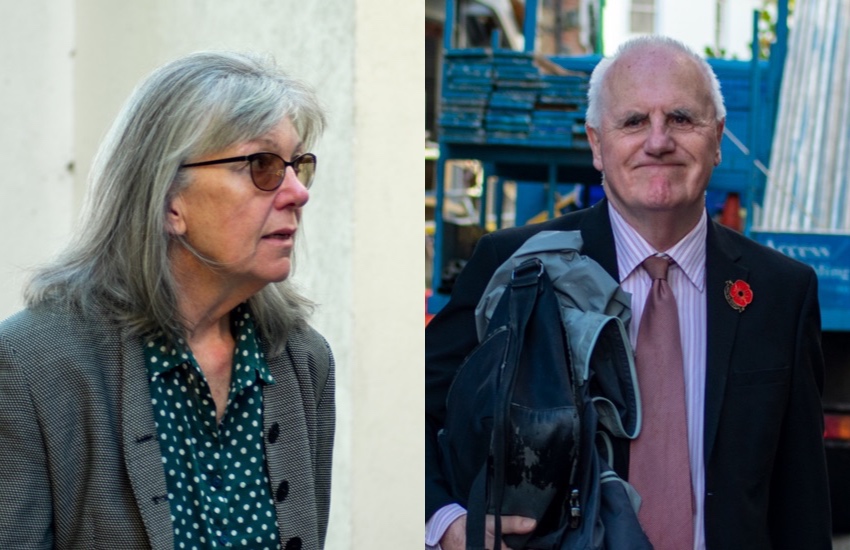
Pictured: Deputy Yvonne Burford's Rule 14 questions were answered by Deputy Peter Ferbrache, President of the Policy & Resources Committee.
"The responses which cause me the most concern are around the lack of public involvement and consultation," she said.
"They make clear that essentially the only opportunity the public will have to comment on development proposals will be when a planning application is put in by the development agency.
"Deputy Ferbrache [President of the Policy & Resources Committee] also stated that the development agency would not be subject to the States' Freedom of Information Code, meaning members of the public and media will not be able to submit requests for information under the Code. I am considering bringing an amendment to try and change that.
"Whilst it has been stated from the outset that no States' land will be sold to third parties without States' approval, land and buildings will be transferred to the ownership of the development agency and, in turn, the development agency will be able to grant long leases of such public land and buildings to third parties as it sees fit, which in practical terms comes to the same thing as selling it.
"I also asked for clarity as to whether popular sites such as Castle Cornet, the Model Yacht Pond and the Bathing Pools would be transferred to the development agency and the reply indicated that, although no decision has been made yet on what land and property will be transferred to them, these areas may well be included."
The Policy & Resources Committee released its proposals on 31 January. They will be debated by the States at their next meeting, which starts on 30 March.
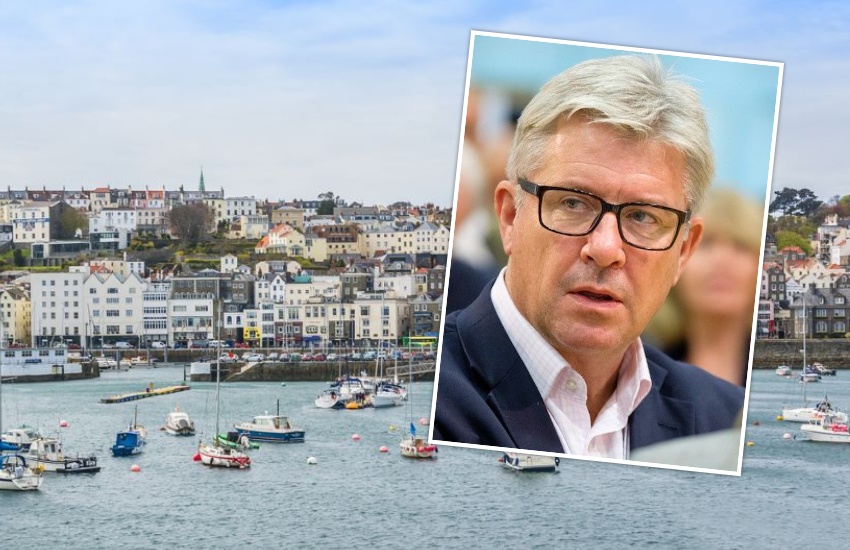
Pictured: When unveiling the proposals for a development agency, the Policy & Resources Committee's treasury lead, Deputy Mark Helyar, said: “There has been significant support for this idea for a number of years, from States’ members, from the community [and] from business representative bodies."
When the proposals were released, the Committee’s treasury lead, Deputy Mark Helyar, said the proposed development agency would be "a delivery vehicle, managing land assets on behalf of the States in the seafront enhancement area, establishing commercial partnerships and working with developers and the community to deliver regeneration projects...to maximise the value of States' assets to the community, including from commercial, environmental and social perspectives".
The Committee said the agency would produce plans for the development of infrastructure along the east coast and work with private sector firms and community partners to deliver those plans.
The Committee said that priorities for the development agency would include:
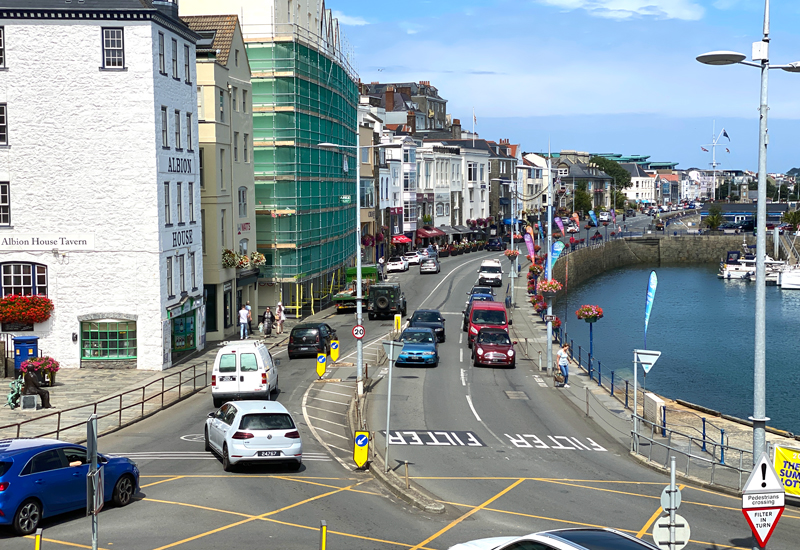
Pictured: The proposed development agency would work up plans to develop land from the Bridge to the southern end of Town.
In his replies to Deputy Burford's Rule 14 written questions, Deputy Ferbrache tried to alleviate concerns that there would be limited public consultation on plans developed by the arm's length development agency.
"The proposals submitted by the development agency will be required to adhere to the requirements of States' strategies and land use policies as any other development proposal would be," said Deputy Ferbrache.
"The Local Planning Briefs will set the relevant land use policies. The Local Planning Brief process is a statutory process with requirements for engagement set out in law, and it must also be approved by the States.
"This means that there will be public engagement in setting the policies which will apply to any development coming forward in the Harbour Action Areas and for any other development requiring a Local Planning Brief. Development not requiring a Local Planning Brief must be in accordance with all of the relevant policies in the Island Development Plan which have themselves all been subject to a statutory engagement process."
In reply to Deputy Burford's questions about the control the development agency would have over public land, Deputy Ferbrache said: "The proposed development agency would manage and own the assets on behalf of the States. The development agency will be able to enter into leasing arrangements with third parties, but it will not have the power to sell any assets without the agreement of the States.
"The length and terms of leasing agreements will vary depending on the land or building, the proposed use, and the investment being made, so to give a hypothetical response at this stage does not seem practical or useful."
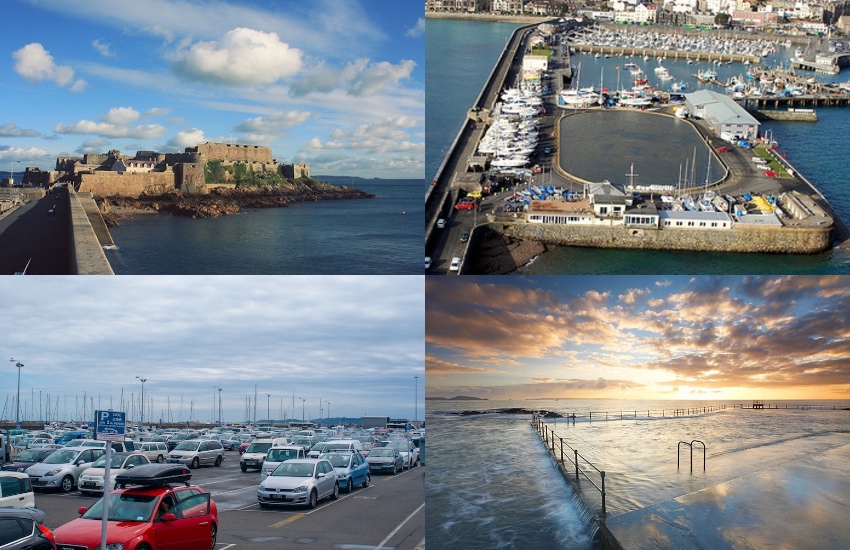
Pictured: Deputy Yvonne Burford questioned whether the proposed development agency would have control over areas of land such as Castle Cornet, the Model Yacht Pond, North Beach and La Valette Bathing Pools.
Deputy Burford said it would be premature for public land to be handed to the proposed development agency before the States have approved an overall vision for the future of the east coast.
"It's quite clear that islanders have a very great interest in the public land, buildings and facilities on the east coast, from the Vale all the way to La Valette, and that they will want to be involved with and have a say about how this land is developed over time," said Deputy Burford.
"My concern is that these proposals will make that more difficult. In my view, it would have been better for an overarching vision for the east coast to have been created and presented for public consultation and subsequent States' approval before considering passing it over to a development agency for delivery."
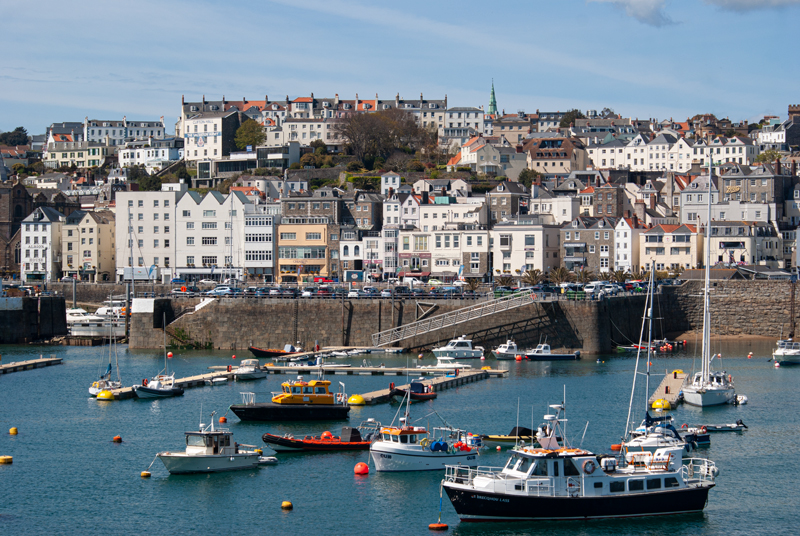
Pictured: Deputy Yvonne Burford argued that the development agency would make it more difficult for the public to have adequate input into the future of the island's east coast.
The questions from Deputy Yvonne Burford and the responses from Deputy Ferbrache can be read in full below.
Questions:
The recently released Annual Monitoring Report of the Island Development Plan states that the Local Planning Brief for the St Peter Port Harbour Action Area cannot be progressed until direction is given in the wider Seafront Enhancement Area masterplan. Proposition 5 of the Establishment of a Development Agency policy letter directs the Development and Planning Authority, inter alia, to complete the Local Planning Brief for St Peter Port Harbour Action Area by the end of this year. By what date will the SEA masterplan will be completed to enable the DPA to fulfil this resolution, if carried?
The policy letter indicates that as yet unidentified States land (and presumably buildings and structures on such land) on the east coast will be transferred to the control of the Development Agency, but that ownership will not change. Will the Development Agency enter into any lease arrangements on any of this land or buildings with investors or developers or other third parties and, if so, what would be the likely terms in years of such leases?
Although the policy letter does make mention of the requirement for the proposed Development Agency to consult various States Committees, the Ports, the political oversight group and ‘relevant’ stakeholders, there is no specific mention of public consultation or engagement. Apart from the standard three-week public consultation period following the submission of planning applications from the proposed Development Agency or its agents, what level and type of public engagement and consultation will the Development Agency engage in prior to proceeding with development opportunities on the East coast in order to ensure that the people of this island are able to have a say in what may well be significant changes?
At present, the Freedom of Information Code of the States of Guernsey applies to States Committees and services. Would the Policy & Resources Committee support extending the FoI Code to include the proposed Development Agency?
In the policy letter, paragraph 1.6 states that the Development Agency will report its progress to the States on an annual basis. However, paragraph 9.14 states that the Development Agency will submit annual reports to the Policy & Resources Committee for publication. Will these reports to be laid before the States by the Policy & Resources Committee?
Paragraph 6.8 states that it will be ensured that the Development Agency is cost neutral to the States by the start of Year 3. What will happen if the Agency fails to meet this objective?
Paragraph 7.5 states that agreement will need to be reached on the criteria by which the States may be asked to invest in potential future development opportunities. Similarly, paragraph 4.5 states that the States may financially support developers by injecting money into projects. Will these criteria or the proposals to subsidise or otherwise use taxpayers’ money to assist private developers be brought before the States?
Paragraph 7.5 further states that Agreement will need to be reached on the policy of any surplus funds or profits generated by the Development Agency and how any such surpluses should benefit the States and the public purse. Who will be the parties to this agreement?
Paragraph 5.9.2.6. states that the board of the Development Agency could be given powers to appoint and define remuneration of staff and that civil servants could also be seconded to the body. Who would grant such powers to the Development Agency and, if civil servants are seconded to the Agency, who will pay to backfill their positions in the civil service?
The land and buildings listed below are all contained within the St Peter Port Harbour Action Area. Is it envisaged that they will be transferred to the control of the proposed Development Agency? Castle Cornet, The Model Yacht Pond, North Beach, and La Valette Bathing Pools.
Responses:
The recently released Annual Monitoring Report of the Island Development Plan sets out the position in 2019 and 2020, and the Committee’s understanding is that since that time thinking has further progressed. The proposed Strategic Direction for the Local Planning Brief is set out in the policy letter. The Local Planning Briefs will provide the enabling policy and the high-level plan, and the long- term development plan provides the delivery mechanism. All three elements will form the ‘SEA masterplan’.
The proposed development agency would manage and own the assets on behalf of the States. The development agency will be able to enter into leasing arrangements with third parties, but it will not have the power to sell any assets without the agreement of the States. The length and terms of leasing agreements will vary depending on the land or building, the proposed use, and the investment being made, so to give a hypothetical response at this stage does not seem practical or useful.
The proposed development agency will be responsible for the long-term development plan which will be the delivery mechanism to bring forward development through the statutory planning process via the submission of planning applications. The proposals submitted by the development agency will be required to adhere to the requirements of States strategies and land use policies as any other development proposal would be, and this is set out in the policy letter. The Local Planning Briefs will set the relevant land use policies. The Local Planning Brief process is a statutory process with requirements for engagement set out in law, and it must also be approved by the States. This means that there will be public engagement in setting the policies which will apply to any development coming forward in the harbour action areas and for any other development requiring a Local Planning Brief. Development not requiring a Local Planning Brief must be in accordance with all of the relevant policies in the Island Development Plan which have themselves all been subject to a statutory engagement process.
As the development agency will be an arm’s length body, the Freedom of Information code that applies to the States of Guernsey will not be applicable.
The Annual Reports will be laid before the States in line with those of other arm’s length bodies.
If the proposed development agency is approved and established, a plan will be put in place in order to seek to achieve this. If it becomes clear that this objective may not be met then the political steering group will consider what steps will need to be taken in those circumstances.
In the event that the States is minded to invest in any scheme, this will follow the same processes that already exist. Any investment would need a clear return in order to protect the interests of taxpayers.
The political steering group, the board of the development agency once appointed and the Policy & Resources Committee.
The development agency will be a stand-alone entity that is limited by guarantee, so it will have powers to appoint staff. In the event of any secondment from the Civil Service, the development agency would need to support the backfill of that officer, as would be the case with any secondment.
As the policy letter sets out, the first step will be to establish a clear land management transfer policy. That will determine the areas of land in scope. It is therefore premature to answer this question.
P&R wants a development agency to run Guernsey's east coast
Some deputies yet to be convinced by development agency plans
Guernsey Party deputies and Chamber welcome east coast plans
Comments
Comments on this story express the views of the commentator only, not Bailiwick Publishing. We are unable to guarantee the accuracy of any of those comments.